 Melissa Anderson
Melissa Anderson
Liberté, égalité, gastronomie: Juliette Binoche and Benoît Magimel star in Trân Anh Hùng’s latest film.
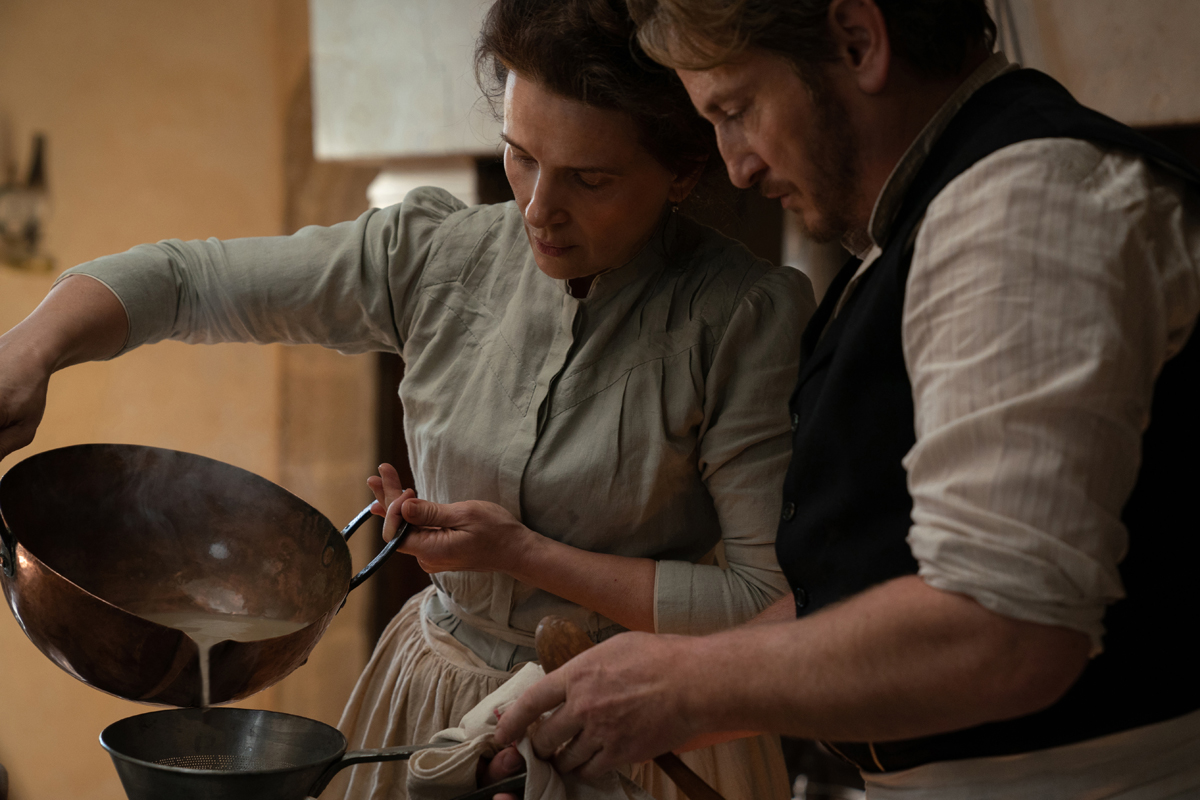
Juliette Binoche as Eugénie and Benoît Magimel as Dodin in The Taste of Things. Courtesy Stéphanie Branchu.
The Taste of Things, written and directed by Trân Anh Hùng,
now playing in theaters
• • •
Opening up my battered copy of Moosewood Restaurant Cooks at Home, published thirty years ago and in my possession for nearly as long, I read this in the introduction: “The rewards of cooking wholesome, delicious food at home are self-evident. There is great potential for pleasure in creatively nurturing oneself and others. Even the humblest foods are capable of providing transcendent moments of beauty and well-being.” Those words were written collectively by the staff of the longest-running vegetarian restaurant in the US, founded in 1973 in Ithaca, New York, by a septet of friends who included members of Lavender Hill, a nearby gay and lesbian commune. They apply just as equally to a time and place that could not be more dissimilar, the setting of Trân Anh Hùng’s The Taste of Things: a château in early Belle Epoque France, home of carnivorous chef Dodin (Benoît Magimel) and his cook and lover, Eugénie (Juliette Binoche).
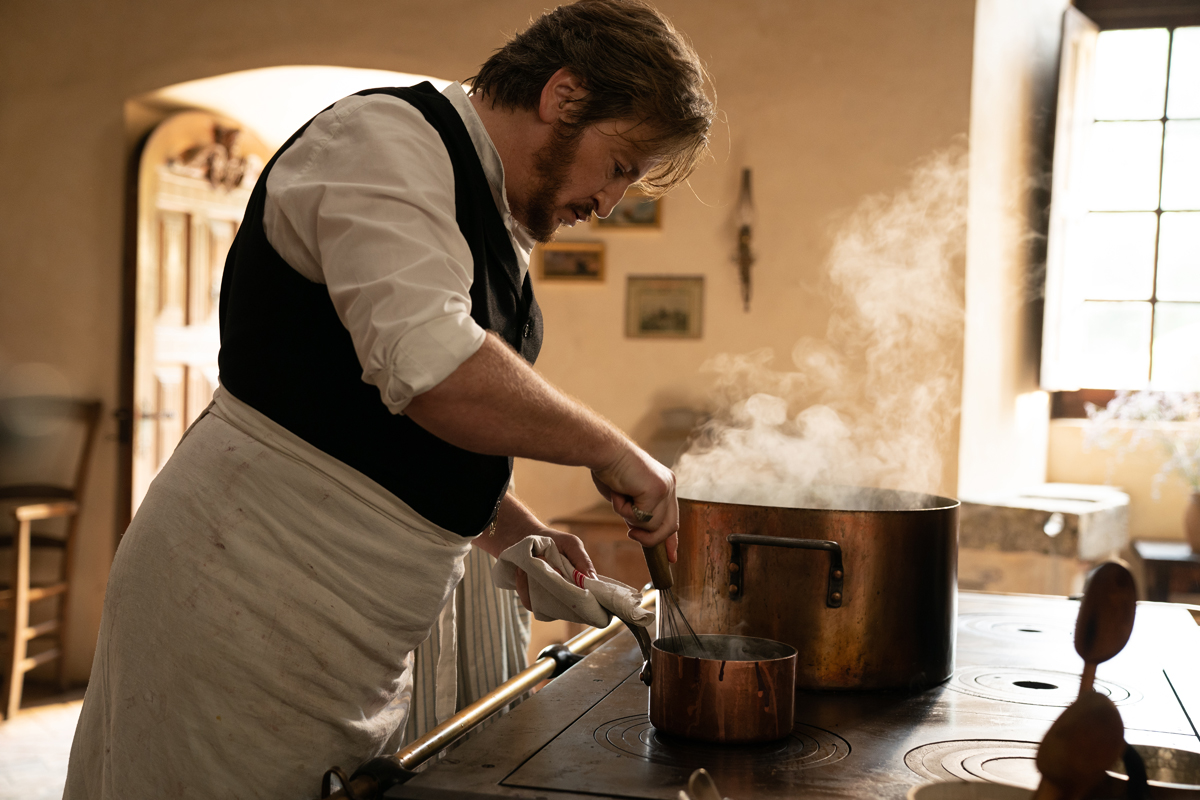
Benoît Magimel as Dodin in The Taste of Things. Courtesy Stéphanie Branchu.
Adapted from Marcel Rouff’s 1924 novel La vie et la passion de Dodin-Bouffant, gourmet, Trân’s movie, his seventh, is thin on plot but thick with set pieces of food being intricately prepared and ecstatically consumed. (The Vietnamese-born filmmaker, who immigrated to France when he was twelve, revealed an interest in the sensorial with his 1993 debut feature, evinced by the title alone: The Scent of Green Papaya.) Much like the thrills a heist film affords as we watch criminals pull off a detailed robbery, such as in Jules Dassin’s Rififi (1955), the satisfactions of The Taste of Things emerge from witnessing an elaborate, step-by-step process. The kitchen choreography—disparate ingredients assembled, discrete actions executed, specific utensils and cookware deployed—performed so adroitly by Eugénie and Dodin, with assistance from their servant, Violette (Galatéa Bellugi), and her preadolescent niece, Pauline (Bonnie Chagneau-Ravoire), a budding cuisinier, is fluidly filmed. The camera, not only in this hectic, densely populated part of the manor but also in calmer segments featuring just Dodin and Eugénie, seems to float, as buoyant as a champagne bubble. (Jonathan Ricquebourg is the cinematographer.)
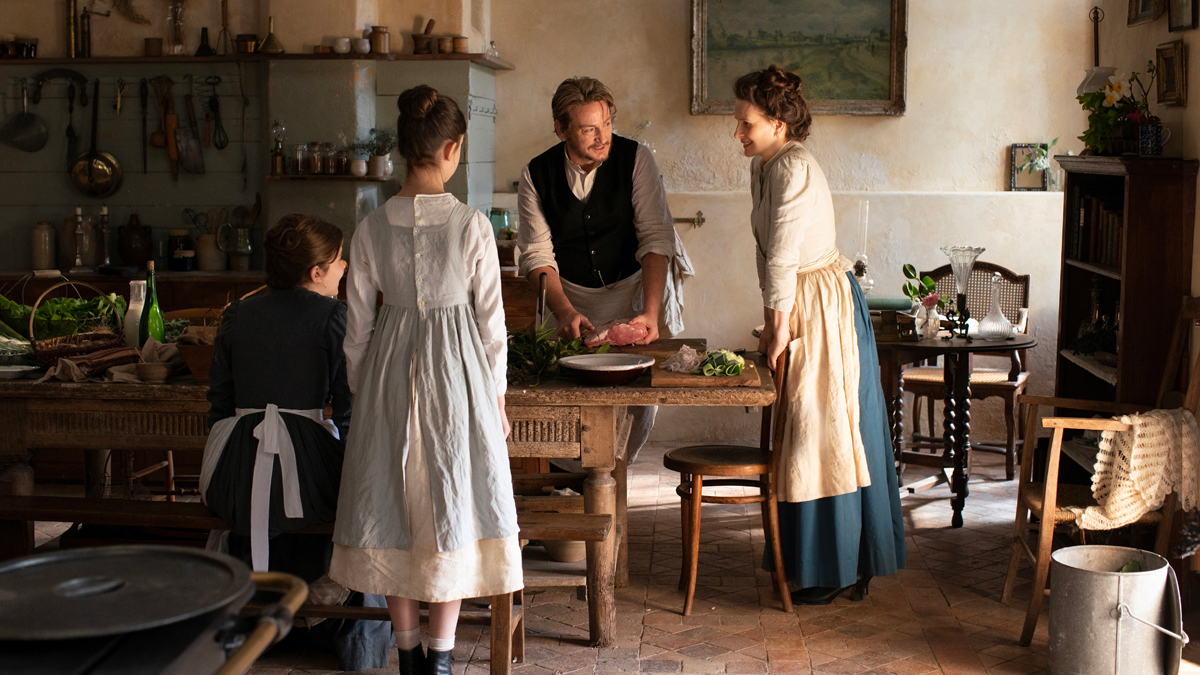
Galatéa Bellugi as Violette, Bonnie Chagneau-Ravoire as Pauline, Benoît Magimel as Dodin, and Juliette Binoche as Eugénie in The Taste of Things. Courtesy Carole Bethuel.
The Taste of Things devotes thirty minutes to the preparation of an enormous feast, made primarily by Eugénie, for Dodin and four gentlemen friends, fellow worshippers of fine food and drink. Turbot cooked in milk, loin of veal with braised lettuces, vol-au-vent, omelette norvégienne (aka baked Alaska): each of these dishes is rightly greeted by Dodin and his tablemates with rapture. And each is also enjoyed by Eugénie, who prefers to eat in the kitchen with her two young female helpers, much to the disappointment of the waistcoated guests, so eager to have the woman they call an artist sit in the dining room with them. “Dodin, can’t you do something to make Eugénie join us?” one of them asks their host as they pay their respects to her after the gluttonous meal. “That’s up to Eugénie,” he answers, his reply emblematic of their atypical, (mostly) egalitarian relationship—one in which she has turned down his marriage proposals repeatedly over the twenty years that they’ve lived and worked together, preferring her own bedroom, her independence.
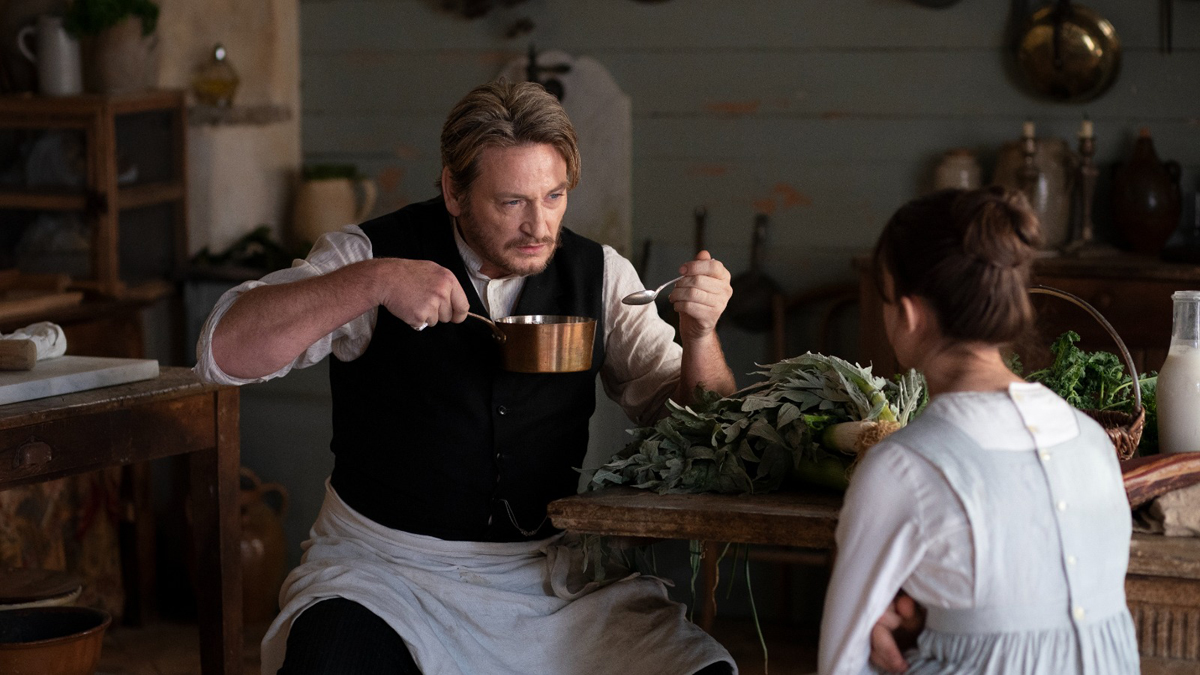
Benoît Magimel as Dodin and Bonnie Chagneau-Ravoire as Pauline in The Taste of Things. Courtesy Carole Bethuel.
Their ménage may be unconventional, but The Taste of Things is a proudly old-fashioned film. “It takes culture and a good memory to shape one’s taste,” Dodin says to Pauline near the end, slightly reproaching the girl for not liking bone marrow. The declaration operates as a thesis statement of sorts for Trân’s movie, which exalts the traditional (at least as far as cuisine is concerned), glorifying French gastronomy as perhaps the signal achievement of the country.
But another crucial element of Gallic heritage is its cinema and, more specifically, its movie stars. Binoche and Magimel are cannily cast in The Taste of Things, heightening its nostalgic glow. She has been an international celebrity, one of France’s most successful exports, since at least 1996, the year Anthony Minghella’s The English Patient was released; he, less famous, has still been a familiar face to art-house audiences going as far back as Michael Haneke’s The Piano Teacher, from 2001. The actors have a real-life backstory that adds some poignance to Trân’s film. Twenty-five years ago, while making Diane Kurys’s Children of the Century (1999)—in which they played another (though fact-based) unorthodox couple of the 1800s, the literary eminences George Sand and Alfred de Musset—they fell in love and later had a daughter. Their relationship ended five years later; The Taste of Things marks their first time acting together since Kurys’s movie.
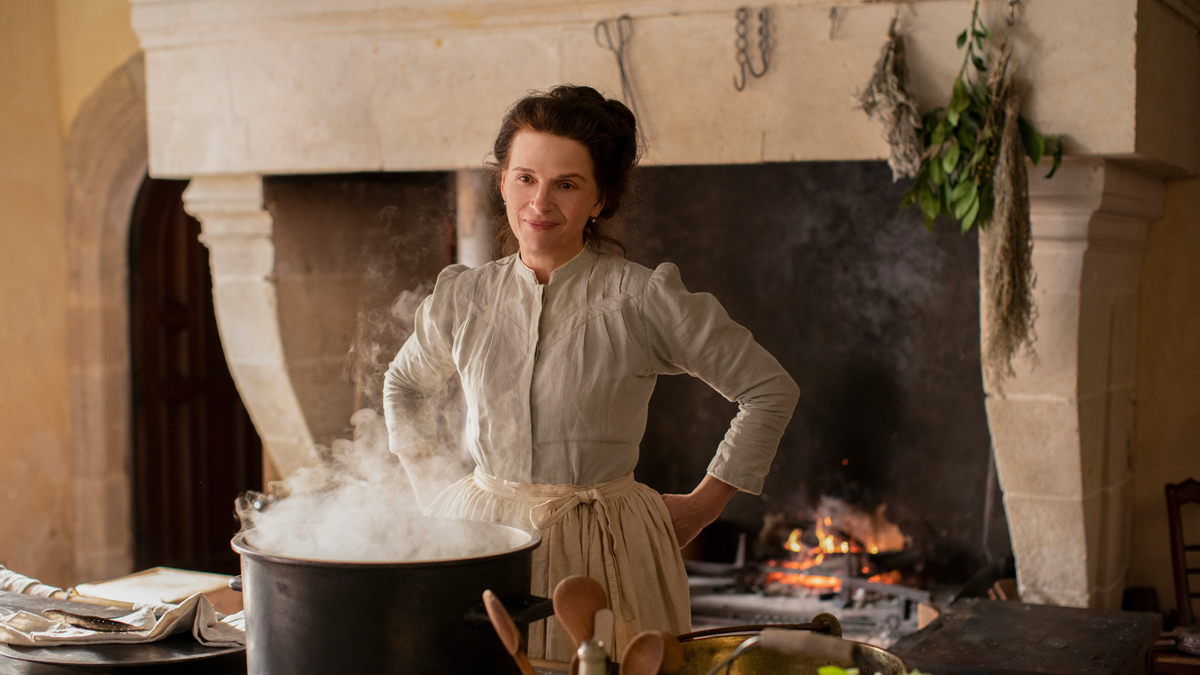
Juliette Binoche as Eugénie in The Taste of Things. Courtesy Carole Bethuel.
We gaze upon Binoche and Magimel in much the same way that we would examine a bottle of Clos de Vougeot or an Anjou pear, paying close attention to how they have aged and ripened. (In Binoche’s case, the fruit analogy is essentially literalized: a close-up of a voluptuous poached pear placed on its side is immediately followed by a shot of a naked, sleeping Eugénie, her position in repose mimicking that of the glistening, alabaster poire.) Binoche, fifty-nine, is ten years her costar’s senior, but she looks at least a decade younger than Magimel. Her radiance seems eternal. But his once-chiseled, handsome face and lithe build have long morphed into “a ruined, dissolute beauty, an ungainly frame,” as I wrote last year in 4Columns, reviewing Pacifiction, which stars an excellent Magimel as De Roller, a dissimulating government official stationed in French Polynesia.
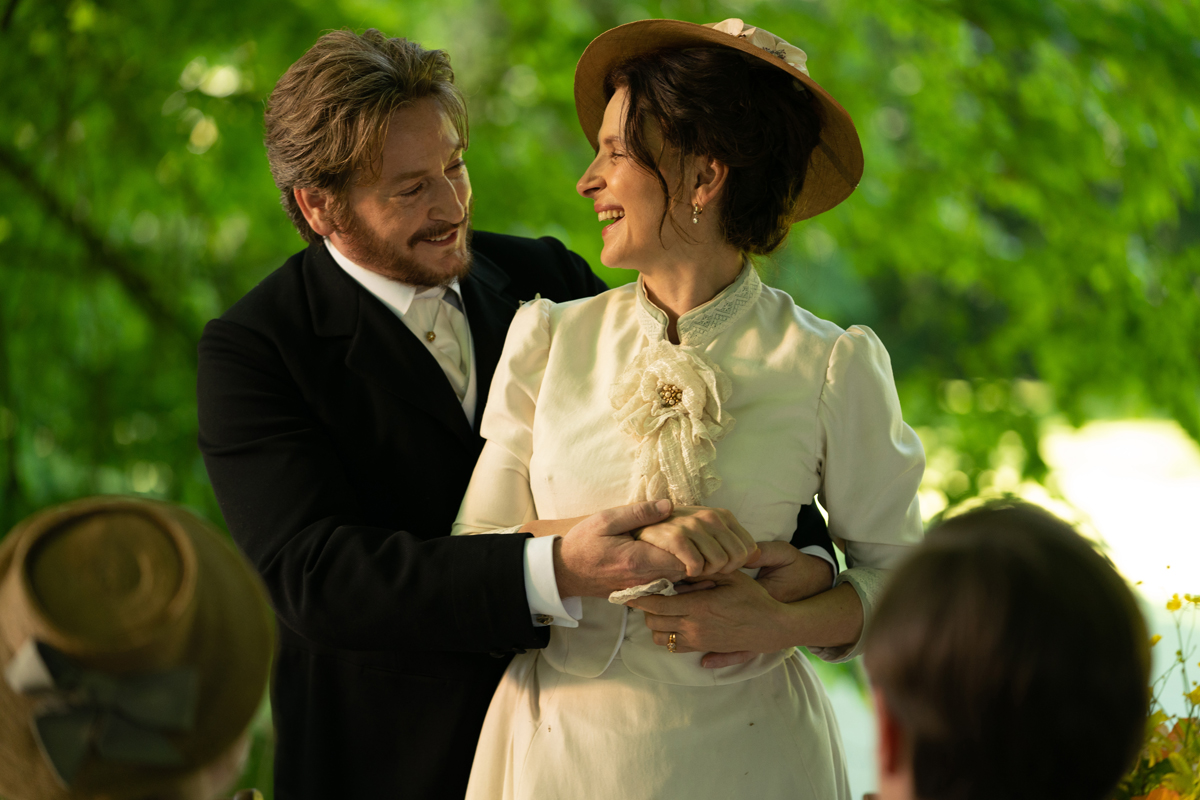
Benoît Magimel as Dodin and Juliette Binoche as Eugénie in The Taste of Things. Courtesy Stéphanie Branchu.
That he looks even more ravaged in The Taste of Things—and sounds feebler, his voice more adenoidal—makes his robust performance of an epicure, of a man energized by appetite, all the more touching, sometimes ridiculously so. Nearly every sentence Dodin utters is a grand pronouncement (as with that gentle rebuke to Pauline above), an epigram (“The first couple, Adam and Eve, started with dessert”), or a historical précis (on the legacy of Antonin Carême, the paramount French chef of the early nineteenth century). Much like De Roller, Dodin exhibits a bonhomous pomposity, especially when he’s with his quartet of gourmand companions.
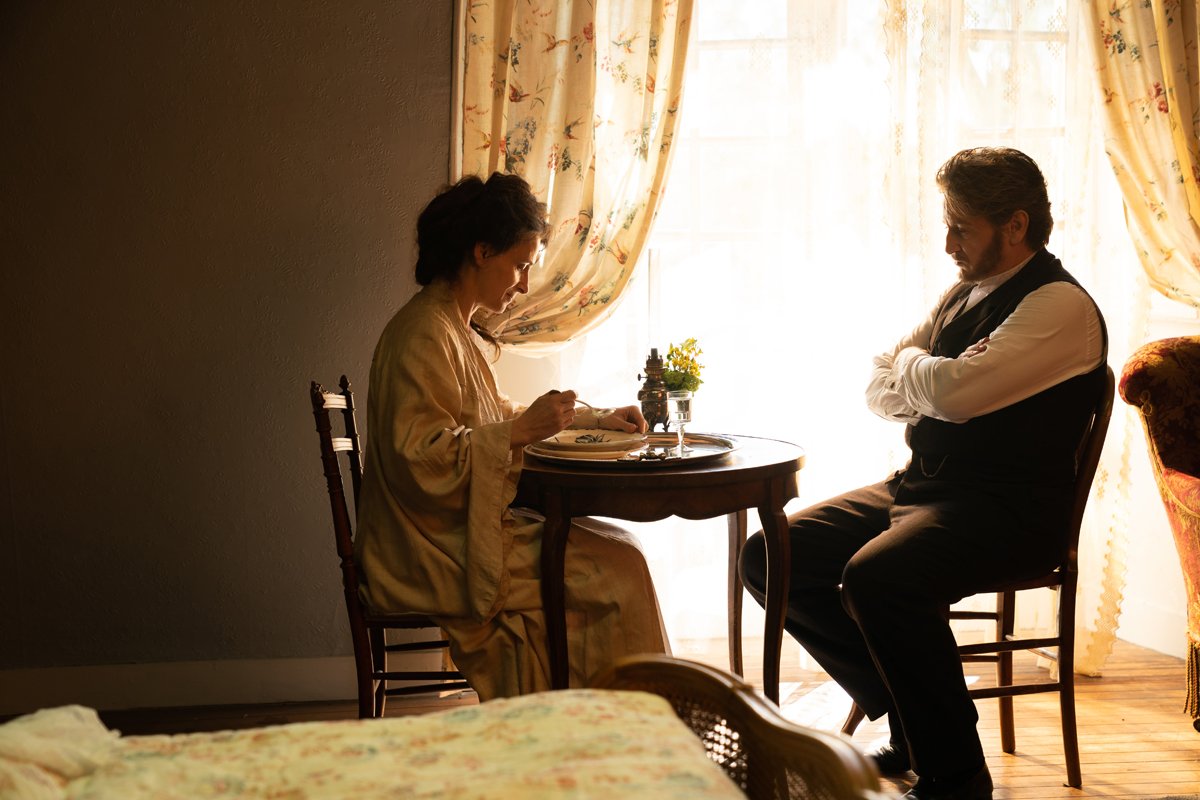
Juliette Binoche as Eugénie and Benoît Magimel as Dodin in The Taste of Things. Courtesy Stéphanie Branchu.
But he shows tremendous tenderness, bordering on supplication, with Eugénie. Magimel marvelously interprets solicitude, animating Didot’s doting attentiveness with just a touch of submissive kink. “May I watch you eat?” he asks Eugénie, about to tuck in to a lavish dinner he’s made for her. One of cinema’s most flamboyantly maximalist actresses, Binoche operates here in a minor key, forgoing her customary histrionics for subtler, richer emotional responses. Like the simple six-minute chocolate cake recipe I’ve followed in that Moosewood cookbook for decades, like the infinitely complex omelette norvégienne that astounds Dodin’s guests, to watch Magimel and Binoche together gives pleasure.
Melissa Anderson is the film editor of 4Columns and the author of a monograph on David Lynch’s Inland Empire from Fireflies Press.